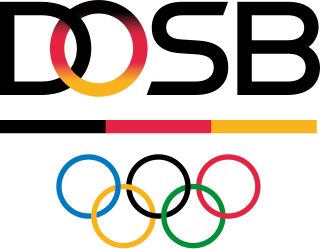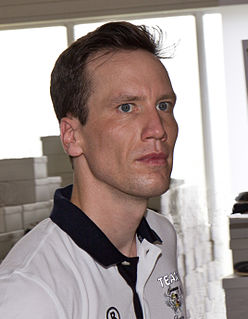
The German Football Association is the governing body of football in Germany. A founding member of both FIFA and UEFA, the DFB has jurisdiction for the German football league system and is in charge of the men's and women's national teams. The DFB headquarters are in Frankfurt am Main. Sole members of the DFB are the German Football League, organising the professional Bundesliga and the 2. Bundesliga, along with five regional and 21 state associations, organising the semi-professional and amateur levels. The 21 state associations of the DFB have a combined number of more than 25,000 clubs with more than 6.8 million members, making the DFB the single largest sports federation in the world.
The German Rugby Federation is the governing body for rugby union in Germany. It organizes the German national team and the three league divisions: the Rugby-Bundesliga, the 2nd Rugby-Bundesliga and the Rugby-Regionalliga. It was founded on November 4, 1900, in Kassel, and is the oldest national rugby union in continental Europe. After the Second World War, the DRV was restored on May 14, 1950.
German Ju-Jutsu is a martial art related to traditional Japanese jujutsu, developed in Germany in the 1960s using techniques from jujutsu, judo, karate and various other traditional and modern martial arts. Its governing body in Germany is the DJJV. Its competitive sport aspects are coordinated internationally by the JJIF ; Ju-jutsu under JJIF rules is a part of the World Games and World Combat Games. The system is taught to the German police forces.

The International Traditional Karate Federation or ITKF is the international governing body for Traditional Karate. This organisation was founded by Hidetaka Nishiyama. In the early 1990s, Nishiyama's refusal to align his ITKF organization with the World Union of Karate-Do Organizations (WUKO) caused the International Olympic Committee to suspend its recognition of WUKO as amateur karate's international governing body. The ITKF and WUKO had been due to merge and form a unified karate organization, but this did not eventuate. The WUKO eventually became the World Union of Karate-Do Federations in late 2008.

The German Olympic Sports Confederation was founded on 20 May 2006 by a merger of the Deutscher Sportbund (DSB), and the Nationales Olympisches Komitee für Deutschland (NOK) which dates back to 1895, the year it was founded and recognized as NOC by the IOC.
Kristof Hopp is a male badminton player from Germany. In 2008, he won the bronze medal at the European Championships in the men's doubles event with Ingo Kindervater. At the same year, he competed at the Summer Olympics in Beijing, China.

Ingo Kindervater is a retired badminton player from Germany.
Kosovo was a part of several international sports federations in the 1990s, and has applied to become a member of many more after its 2008 declaration of independence from Serbia.
Ines Pianka is a retired German female volleyball and beach volleyball player.
The Federación Internacional de Pádel is the world governing body for the sport padel, founded in 1991 in Madrid by the Argentinian, the Spanish and the Uruguayan Federation legal representatives. It is a non-profit making organisation whose goal is to promote all forms of padel around the world.
Max Weißkirchen is a German badminton player. In 2014, he participated at the Summer Youth Olympic Games in Nanjing, China. In 2015, he won gold and silver medals at the European Junior Badminton Championships in mixed doubles and boys' singles events.
Luise Heim is a German badminton player. She competed at the 2014 Summer Youth Olympics in Nanjing, China. Heim was the bronze medalists at the 2015 European Junior Championships in the girls' singles and mixed team event.
Linda Efler is a German badminton player who became the member of the national team in 2013.
Mark Lamsfuß is a German badminton player and plays for the BC Wipperfeld.
Karen Neumann is a German badminton player. She competed at the 1996 and 2000 Summer Olympics. In the national event, Neumann who played for the FC Langenfeld had won eight titles at the National Championships. Neumann was the bronze medallists at the 1996 European Championships in the mixed doubles event, and at the 1989 European Junior Championships in the girls' doubles event.
Michael Keck is a German badminton player. Keck clinched nine titles at the National Championships, won the first time in 1990. He was the bronze medallists at the 1996 European Championships, winning the mixed doubles event at the World Grand Prix tournament in 1997 Swedish Open. Keck has collected 65 caps for Germany and competed at the 1996 and 2000 Summer Olympics. His brother Markus Keck also a former German professional badminton player.
Michael Helber is a German badminton player. He competed at the Summer Olympics in 1996 and 2000. Helber was the bronze medalist at the 1989 European Junior Championships in the mixed doubles event partnered with Kerstin Weinborner. Played for the Fortuna Regensburg, he had won five consecutive men's doubles title at the German National Championships partnered with Michael Keck in 1995 and 1996; and with Björn Siegemund in 1997, 1998 and 1999.
French Karate Federation it is the largest association for karate in France and a member as well as the official representative for this sport in the French National Olympic and Sports Committee.










